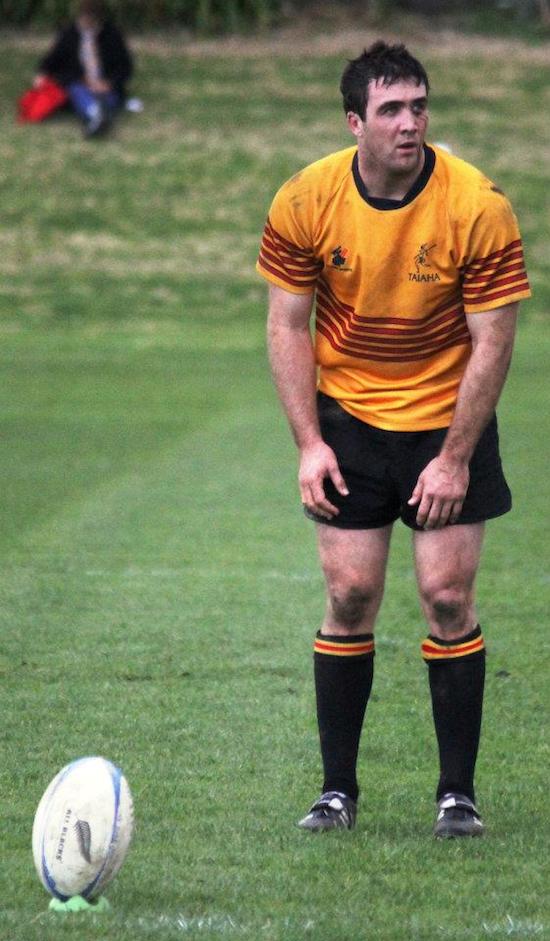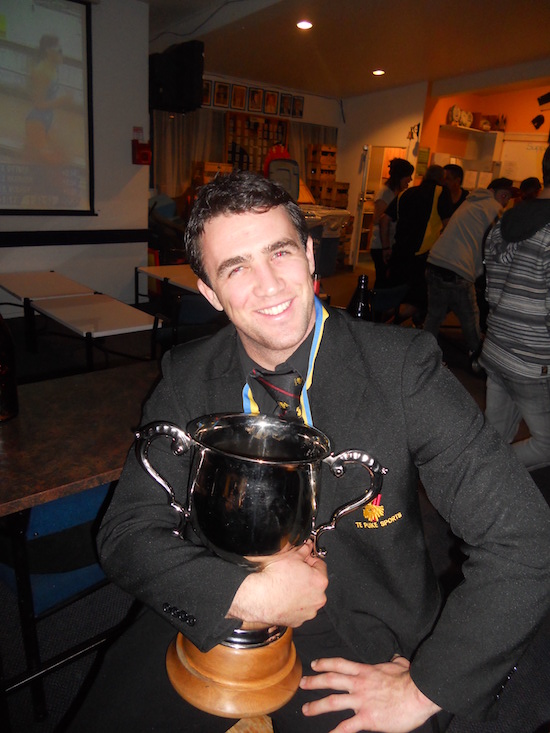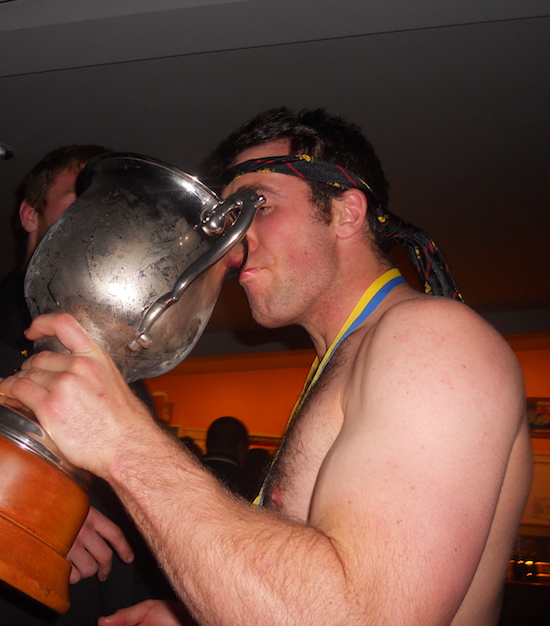As I drove up to the testing station it all felt like I was in some kind of movie. There wasn’t as much panic as the movie “I am Legend” but still it felt as though I was playing my part in it. Lockdown had started in March yet the virus had only just reached me in September. The truth is I felt bad for even going for a test as the government had only asked us to test if we had symptoms. My only marginal symptom was tiredness but I would mostly put that down to working from home with a toddler and a new born lockdown baby. Plus I had just completed 60kms of running in a lead up to my first Ultra marathon. However I had come in direct contact with a positive case and following the rugby unions advice and my own personal curiosity I proceeded to get tested. Little did I know I was going to test positive for Covid-19 a few days later…
By law, after a positive test you must self-isolate for 10 days from your symptoms. Having had no symptoms whatsoever it was 10 days from my test. A positive test was a shock, more of a surprise if anything. Just another level of stress and uncertainty added to life. Luckily I had decided a long time prior to lockdown that I was going to be the master of my own house and no matter what happened to me I was committed to being happy even in uncertain times.
Taking care of my own house first would allow me to be a better husband, Dad and person. Taking care of myself means a number of things but the two key elements for me are physical activity and a growth mindset. Physical activity has always been my go to or as the Rock describes it as my anchor.
Recently I revisited my own values and character strengths as part of building on my growth mindset. Whenever I do I always get some sort of insight small or large. Knowing more about yourself during this uncertain time can only be a positive thing and give you more certainty right?. One of the results mentioned that my biggest strength was self control and self regulation. So if you are wondering how I reacted to the positive Covid-19 test, well it made little impact. “You self-consciously regulate what you feel and what you do. You are a disciplined person. You are in control of your appetites and your emotions, not vice versa”
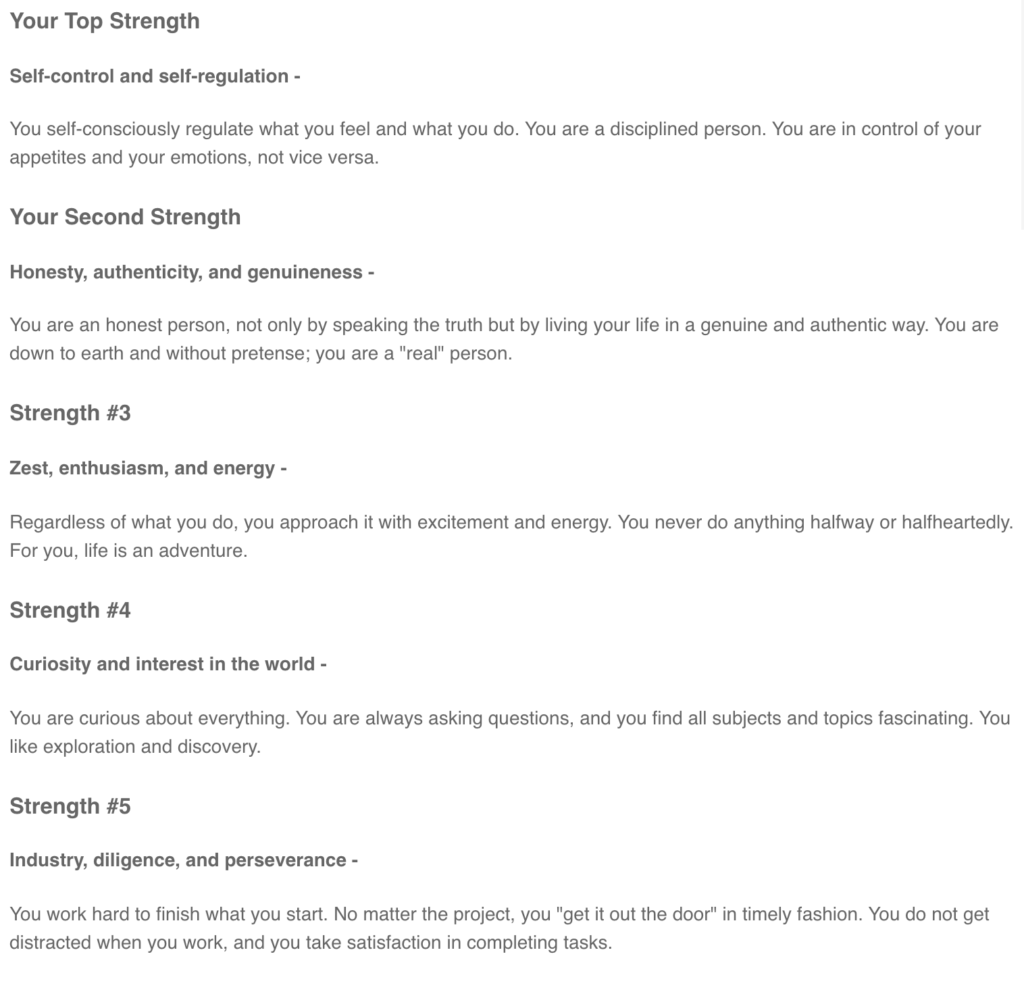
I will be the first to admit I do not think of myself as a highly emotional person. That can be viewed a number of ways good and bad. I like to think when I am presented with an uncertain time or uncertain situation that I am still able to think clearly through the options and make a good decision. As my coach from the Neuroleadership group Bret Freeman explains “I do not flip my lid. That my decisions are mostly made in the pre frontal cortex rather than the limbic system”
As for my emotional responses I can give you an example of a situation I have been in with regards to sport. When I have kicked the winning goal at Rugby and when we won the club championships my first emotion was more relief. Relief that all the hard work had paid off. So the immediate celebration was not like my other team mates who were jumping for joy, cheering, hugging and dancing around. My initial reaction was of calm, its what happened later I expressed that emotion…
I am not immune to getting fired up, trust me I have had my fair share of blow ups. Some of those examples are not worth mentioning. In my younger years on the rare occasion the result was mostly some sort of altercation. Now I like to think of myself as a duck on the water. Calm on the surface without a worry but underneath the water there is a lot of movement. Through Bret and the amazing team at the Neuroleadership Institute I have been introduced the the SCARF model. Its something that once you learn of it can not be unlearnt.
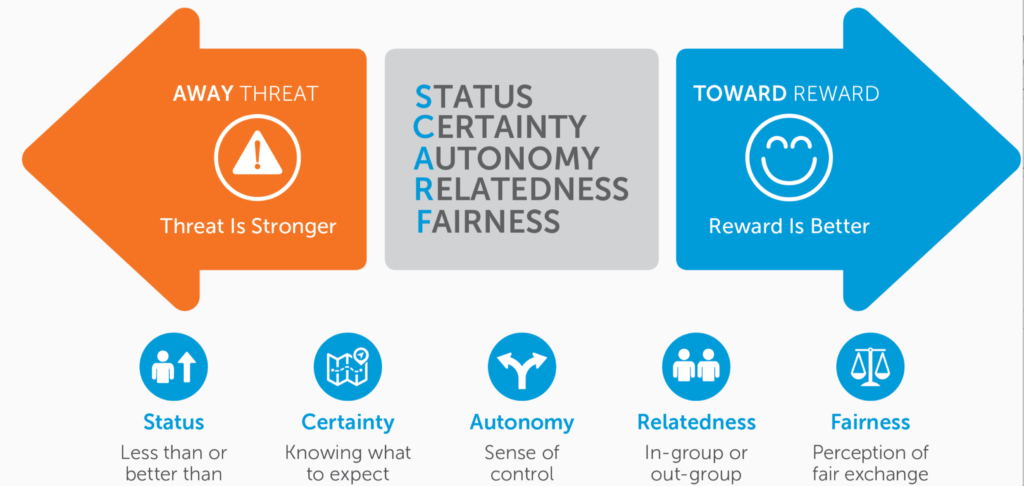
The purpose of the SCARF model is an easy way for us to remember what might cause us to react in a certain way. Are we responding from our pre-frontal cortex or our limbic system or in a toward state or threat state. Will we flip our lid?. Understanding these domains can help us become better individuals and leaders in all social environments. Below I will briefly touch on each domain.
Status – One of the reasons why social media has been so impactful can be drawn from our need for status. We see status as important and it signifies our value to the group and therefore connects us. (Reading – Matt Lieberman, Social)
Certainty – The brain likes to know. It’s a pattern recognising machine. Having a high level of uncertainty can have a negative effect on our performance. The pandemic really should have told us it was going to be around much longer that the government predicted. Then we might have been able to prepare without fear or insecurity.
Autonomy – When we have a choice. A classic example of this is when your boss wants to micro manage your work. When the choice of doing report A vs report B are both shit, the employee at least gets a sense of autonomy when given the option to choose.
Relatedness – A sense of belonging. This is something that goes missing immediately on your retirement from team sports. The biggest thing that is missed when we finish in Rugby is often the lads and the chat. Everyday you have 30-40 friends you see and train with for a common goal and an active whats app group pinging away most days.
Fairness – Everyone wants to know they have been dealt a fair hand. Should we have been cheated in cards or any activity we can experience a whole lot of negative emotions. In sport we can often have our contracts terminated in a number of ways and it’s the leaderships team to consider fairness to make that transition easier for both parties.
The five domains can trigger a threat or reward response in the Brain so as leaders in sport or business it is our job to understand this. It is easy to trigger a threat response in others accidentally or on purpose. Should we trigger a negative response will simply result in the least desirable outcome. Coaching or leadership practices that follow a brain based approach can be more productive and insightful. If you would like to learn more about the SCARF model or discuss how brain-based coaching can transform your business or personal transition from sport in an uncertain time just send us a quick message in reply to this article or send a message to us via the website contact page

